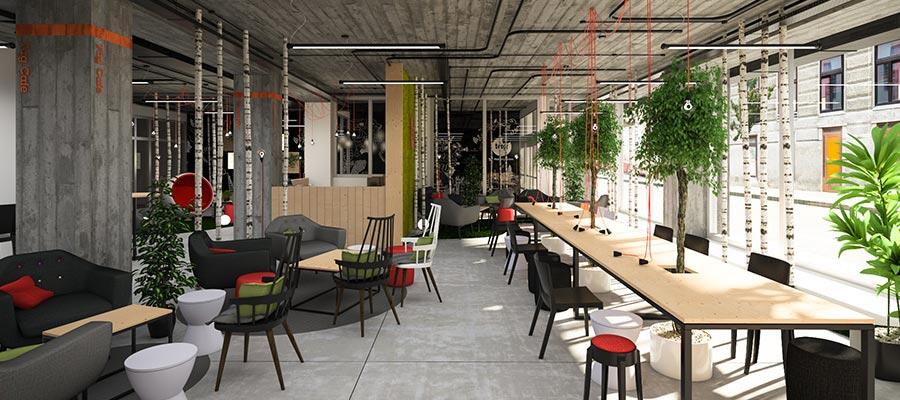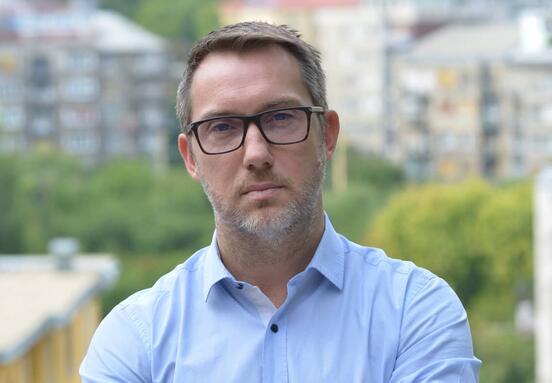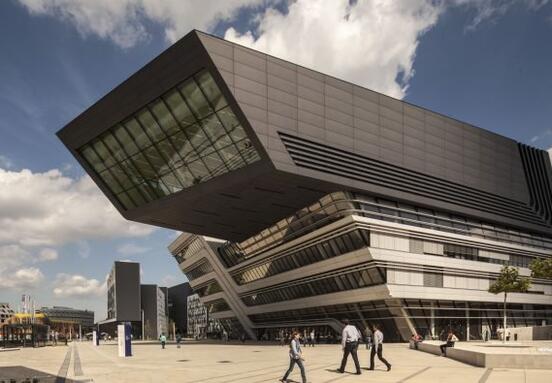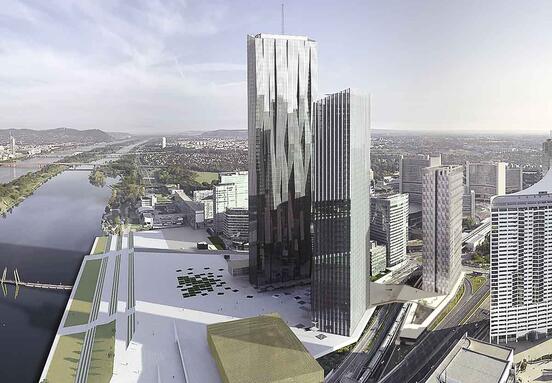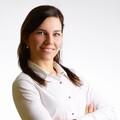But then the start was postponed again and again - because the first chosen property ultimately proved to be not suitable. At the beginning of 2019 he should finally become reality. Then the first startups and companies will move into the 9th District of Vienna's Liechtensteinstrasse 111-115. The parent company Talent Garden from Italy now operates a network of 25 coworking spaces in Europe - from Dublin to Barcelona to Rome - which are also available to paying members. From January 2019 onwards, the divisional opening will follow floor by floor until finally a total of six floors with a total of 5,000 square meters will be available - probably in March or April 2019. Startup300 (10.3 percent stake in the Vienna Talent Garden) will be moving in, Raiffeisenbank International (RBI), Pioneers, Startup Live and Conda, in addition, the site is promoted by the business agency with about 146,000 euros.
Martin Giesswein and Max Lammer have been in charge of the project from the very beginning as founding partners and are now handing over operational management to a new team (including Heinz Grottenegg as campus manager). In an interview with Trending Topics, the two explain why the launch has been delayed so long, how startups, freelancers and corporates should mix and why one should not compare the space with a conventional office. Trending Topics: The naughty question first. Why did it take so long to launch Talent Garden in Vienna? Martin Giesswein: Because we did a decent pivot like a good startup (laughs). We changed the building. Now we have the right building, the renovation is finished, the first furniture comes in, and with the turn of the year the first tenants move in. It has been a glimpse of emotions. You just have to stay tuned. The good thing is that we have kept the investment promised to Vienna by the headquarters in Italy. The sponsors have also remained. And we still have the demand.
Max Lammer: We also found new ecosystem partners, startup300, and new members like Pioneers. Since we have managed a cool extension. How is the new building structured? Lammer: The campus has six floors. On the ground floor is a public cafe. The first floor is where the coworking area starts and is also the floor for the Talent Garden Innovation School. There are work areas on the other four floors, and on the sixth floor there is an event space and the community kitchen. On each floor it alternates very easily between open space and private offices. Getting together at every level is also supported by small coffee areas. So freelancers, startups, SMEs and corporates should mix on each floor?
Giesswein: That's exactly how it is. It has been shown internationally that for innovative projects it should not be a monoculture of startups, but it needs a mix. There will be one third of startups, one third of EPUs and SMEs, and one third will be teams of corporates doing projects and exchanging ideas with others. This is the Magic Mix, which is pulled through at all 25 Talent Gardens. How strong is the concept from the Italian headquarters of Talent Garden? Does the Vienna location have room for design? Lammer: Design has a consistent line. Each campus is like the others in terms of presentation and look and feel. This is based on the experience from the 25 sites that already exist. Otherwise, the location of Vienna has freedom in event concepts or the Innovation School. Giesswein: The Local Co-Founders, which Talent Garden has in the development phase in every city - and in Vienna, for us - ensure local adaptation. There were community meetings in advance to get concrete input. It's about simple things like: There has to be a shower, because many people in Vienna will come by bicycle or go for a walk in between. Or that the coffee in Vienna may not exceed a certain price.
How much of the campus is already booked? Lammer: We hold about 45, 50 percent. The goal is to fill the first three floors of the campus with as much life as possible. And then new members will come in and move in to the other floors. The filling of the house takes place successively. For larger teams, the Talent Garden is very expensive - you pay between 180 and 350 euros per person. Because you could afford a nice own office. Giesswein: The question is, if you can compare that. You get the exchange with the others and the complete infrastructure. You can make your own events and go to the other events. This is difficult to compare with a conventional office. For whom is it optimal? Giesswein: The international experience shows that it is ideal for young teams and sole proprietors. They grow up in the Talent Garden and then go to their own office where they can look more closely at internal processes. But there are many companies that want to keep a small satellite office in the Talent Garden and stay part of the family. Young companies stay on average 18 months. Talent Garden was often compared to weXelerate. What are the main differences? Lammer: There are two different approaches that do not compete. Talent Garden aims to be the physical platform for an innovation ecosystem. We have the possibility for a member to make an accelerator program, but we are not an accelerator program ourselves. That is the very clear distinction.
Giesswein: At Talent Garden, rent is the main source of income. As a result, we are primarily committed to the community. The startup, the person has to be happy there. Lammer: Of course there are corporate partners doing their programs here, but the primary obligation is the community. Raiffeisenbank International is on the ball and there are also inquiries from other major companies. But we try not to let the number get too big, because otherwise the service quality would suffer. This is very handpicked. WeWork will also come to Vienna. Will Talent Garden have to stand up to US competition? Giesswein: For Vienna it's great that all modern providers of innovation campuses and coworking spaces want to. There will be much more. Everyone differs in their approach, there are many different forms. Demand still exceeds supply, so that's no problem. The coachmen did not even think that the Ford sold so many cars. The more suppliers come, the easier it will be to physically make the new world of work that we talked about for so long. Anyone can live that now, and for a fair price. Martin Giesswein and startup300 are investors in trending topics.
(Source: https://www.trendingtopics.at/talent-garden-wien-2018/ Jakob Steinschaden)
